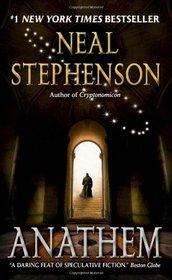Helpful Score: 4
This is set on a world parallel to ours in which, thousands of years ago, all the smart people were ostracized from the rest of society. They went to live in non-religious convents where they live very simply, but are free to pursue their own thoughts and projects and only occasionally interact with the outside world. Children from the outside who display signs of too much intelligence are brought to these convents to live. All proceeds as normal for thousands of years until all over the world something strange is seen through observatory telescopes. To tell more of the plot would be impossible without spoilers. As the plot progresses though, the reader's understanding of what has already occurred also evolves in a very interesting way.
This book has a vocabulary all it's own (there's a 20-page glossary at the end that includes entries such as my personal favorite "hypotrochian transquaestiation") along with an entirely new kind of science. A large portion of this novel actually consists of characters discussing theoretical science. As such, it takes some persistence to get into--I wasn't hooked until about 140 pages in. For the most part, this book rocks! The author's ability to create all the intricacies of this world, to maintain a sufficient interest level for over 900 pages and to keep the complexity of the plot increasing as it goes is astounding. I love a book that makes me think and to work a little while I'm reading. This is definitely such a book.
However, I do have a few bones to pick. For starters, the complicated theories and discussions of the characters may have been a little over the top and may have bogged down the story a bit. I also didn't particularly care for the ending. I didn't quite understand how what happened could have happened the way it did (which I can't explain without spoilers). There was also a thread of romance running throughout the story that I felt fell flat. I would've liked to have seen this either developed a little more or eliminated entirely.
I would definitely recommend this to anyone with persistence who enjoys spec fic!
This book has a vocabulary all it's own (there's a 20-page glossary at the end that includes entries such as my personal favorite "hypotrochian transquaestiation") along with an entirely new kind of science. A large portion of this novel actually consists of characters discussing theoretical science. As such, it takes some persistence to get into--I wasn't hooked until about 140 pages in. For the most part, this book rocks! The author's ability to create all the intricacies of this world, to maintain a sufficient interest level for over 900 pages and to keep the complexity of the plot increasing as it goes is astounding. I love a book that makes me think and to work a little while I'm reading. This is definitely such a book.
However, I do have a few bones to pick. For starters, the complicated theories and discussions of the characters may have been a little over the top and may have bogged down the story a bit. I also didn't particularly care for the ending. I didn't quite understand how what happened could have happened the way it did (which I can't explain without spoilers). There was also a thread of romance running throughout the story that I felt fell flat. I would've liked to have seen this either developed a little more or eliminated entirely.
I would definitely recommend this to anyone with persistence who enjoys spec fic!
Helpful Score: 3
Stephenson stumbles, or what happens when an author thinks he's outgrown the need for an editor.
I'm a big fan of Neal Stephenson, and was excited when this book came out. What a disappointment. The premise is interesting; an order of monks who (like Stephenson) worship math are the only ones on earth who hold the knowledge to potentially save the planet from a threat. Throw in the usual Stephenson sci-fi twists, like parallel universes, and you have the bones of a good story.
The problem is, Stephenson's usually entertaining stream-of-consciousness writing style fails here. The book is unfocused, self-indulgent, and ultimately rather dull. Although not his longest book, it is far too long for the story it seeks to tell. After 900+ pages I felt, not as though I'd been taken on a warpspeed trip through Stephenson's fertile imagination, but rather that I'd watched him preen in a mirror, admiring the reflection of a popular author.
I'm a big fan of Neal Stephenson, and was excited when this book came out. What a disappointment. The premise is interesting; an order of monks who (like Stephenson) worship math are the only ones on earth who hold the knowledge to potentially save the planet from a threat. Throw in the usual Stephenson sci-fi twists, like parallel universes, and you have the bones of a good story.
The problem is, Stephenson's usually entertaining stream-of-consciousness writing style fails here. The book is unfocused, self-indulgent, and ultimately rather dull. Although not his longest book, it is far too long for the story it seeks to tell. After 900+ pages I felt, not as though I'd been taken on a warpspeed trip through Stephenson's fertile imagination, but rather that I'd watched him preen in a mirror, admiring the reflection of a popular author.
Helpful Score: 2
Anathem is an interesting book. Be warned though it is light on action, moves quite slowly at times and is heavy on dialogue (most of that being scholarly debate). If you can get past that, it is still well worth reading.




